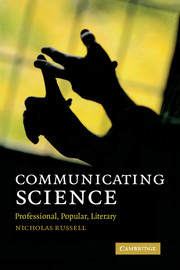Book contents
- Frontmatter
- Contents
- Introduction: What this book is about and why you might want to read it
- Prologue: Three orphans share a common paternity: professional science communication, popular journalism and literary fiction are not as separate as they seem
- Part I Professional science communication
- Part II Science for the public: what science do people need and how might they get it?
- Part III Popular science communication: the press and broadcasting
- Part IV The origins of science in cultural context: five historic dramas
- 15 A terrible storm in Wittenberg: natural knowledge through sorcery and evil
- 16 A terrible storm in the Mediterranean: controlling nature with white magic and religion
- 17 Thieving magpies: the subtle art of false projecting
- 18 Foolish virtuosi: natural philosophy emerges as a discipline but many cannot take it seriously
- 19 Is scientific knowledge ‘true’ or should it just be ‘truthfully’ deployed?
- Part V Science in literature
- Index
- References
17 - Thieving magpies: the subtle art of false projecting
Published online by Cambridge University Press: 02 December 2010
- Frontmatter
- Contents
- Introduction: What this book is about and why you might want to read it
- Prologue: Three orphans share a common paternity: professional science communication, popular journalism and literary fiction are not as separate as they seem
- Part I Professional science communication
- Part II Science for the public: what science do people need and how might they get it?
- Part III Popular science communication: the press and broadcasting
- Part IV The origins of science in cultural context: five historic dramas
- 15 A terrible storm in Wittenberg: natural knowledge through sorcery and evil
- 16 A terrible storm in the Mediterranean: controlling nature with white magic and religion
- 17 Thieving magpies: the subtle art of false projecting
- 18 Foolish virtuosi: natural philosophy emerges as a discipline but many cannot take it seriously
- 19 Is scientific knowledge ‘true’ or should it just be ‘truthfully’ deployed?
- Part V Science in literature
- Index
- References
Summary
Subtle, an alchemist, outlines how base metals can turn to gold
‘It is, of the one part,
A humid exhalation, which we call
Materia liquida, or the unctuous water;
On th'other part, a certain crass, and viscous
Portion of earth; both which, concorporate,
Do make the elementary matter of gold:
Which is not, yet, propria material,
…
Where it retains more of the humid fatness,
It turns to sulphur, or to quicksilver:
Who are the parents of all other metals.
Nor can this remote matter, suddenly,
Progress so from extreme, unto extreme,
As to grow gold, and leap o'er all the means.
Nature doth, first, beget th'imperfect; then
Proceeds she to the perfect. Of that airy,
And oily water, mercury is engendered;
Sulphur o' the fat, and earthy part: the one
(Which is the last) supplying the place of male,
The other of the female, in all metals.
Some do believe hermaphrodeity,
That both do act, and suffer. But, these two
Make the rest ductile, malleable, extensive.
And even in gold, they are; for we do find
Seeds of them, by our fire, and gold in them:
And can produce the species of each metal
More perfect thence, than nature doth in earth.
Beside, who doth not see, in daily practice,
Art can beget bees, hornets, beetles, wasps,
Out of the carcasses, and dung of creatures:
Yea, scorpions, of an herb, being rightly placed:
And these are living creatures, far more perfect,
And excellent than metals.’
Ben Jonson, The Alchemist, Act 2 scene 3.- Type
- Chapter
- Information
- Communicating ScienceProfessional, Popular, Literary, pp. 219 - 226Publisher: Cambridge University PressPrint publication year: 2009



